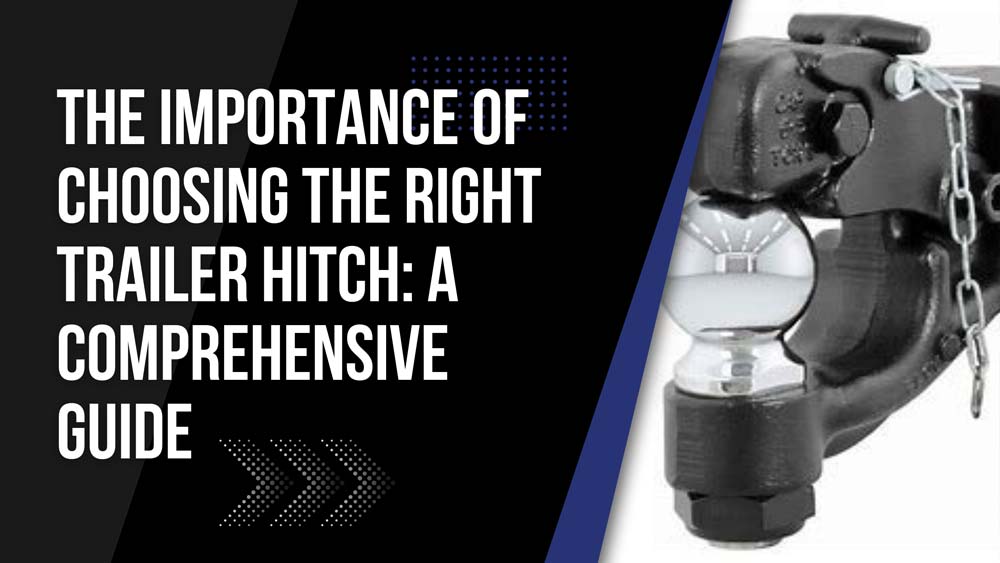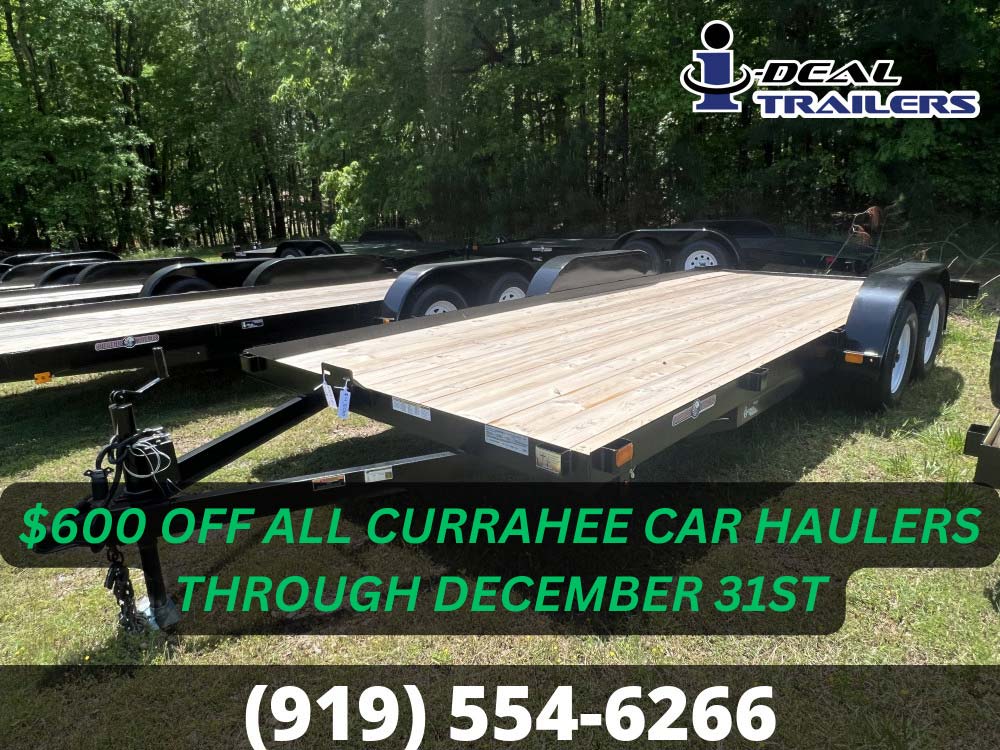
Whether you're preparing to purchase a new trailer or have already made the investment, one critical aspect to consider is the trailer hitch. A reliable hitch securely connects your towing vehicle to your trailer, offering safety and assurance on the road. However, selecting the right hitch can be overwhelming, with various types and weight capacities to consider. In this comprehensive guide, we'll break down the importance of choosing the right hitch for your towing needs and discuss key factors to help you make an informed decision.
1. Hitch Components: Understanding the Basics
Before delving into the different types of trailer hitches, it's essential to have a basic understanding of the main components involved. These include the hitch receiver, hitch ball, ball mount, and safety chains. The hitch receiver is the square opening at the rear of your towing vehicle that connects to the ball mount. The ball mount, in turn, holds the hitch ball, which securely fastens the trailer coupler and completes the connection.
2. Hitch Classes: Matching Your Towing Vehicle and Trailer Weight
Hitch classes are divided into various categories based on their towing capacity. Before selecting a hitch, determine the gross trailer weight (GTW) and tongue weight (TW) of your towing setup. The GTW refers to the total weight of your trailer, including cargo, while the TW is the downward force exerted on the hitch ball. Always check your vehicle's owner's manual for the recommended hitch class, ensuring compatibility with your vehicle's towing capacity.
3. Types of Trailer Hitches: Finding the Perfect Fit
Trailer hitches come in various styles to cater to a wide range of towing needs. Some common hitch types include:
- Rear Receiver Hitches: Suitable for a variety of trailer types, they are typically the most prevalent hitch style and compatible with most vehicles.
- Weight Distribution Hitches: Designed for trailers with heavier loads, they help distribute weight evenly across the trailer for better vehicle control.
- Fifth-Wheel Hitches: Used primarily for towing large trailers or campers, these hitches are integrated into the bed of pickup trucks for secure connection and easy maneuvering.
- Gooseneck Hitches: Similar to fifth-wheel hitches but with a different ball mount connection, these hitches are ideal for trailers with heavy loads, offering stability and increased handling.
When selecting a trailer hitch, consider factors such as your towing requirements, vehicle type, and desired features. Consult your vehicle's owner's manual for recommendations, and ensure that the hitch you choose is compatible with your specific towing setup.
Hitch Components: Going Beyond the Basics
Now that you have a general understanding of the main hitch components, it's crucial to delve deeper into the available options, ensuring you select the best-suited setup for your towing needs.
1. Trailer Couplers
The coupler is the connection point between your trailer and the hitch ball. Ensure the coupler size matches the hitch ball diameter and has the appropriate weight capacity to accommodate your trailer's weight.
2. Ball Mounts
Ball mounts come in various styles, such as fixed, adjustable, and multi-ball mounts. Adjustable ball mounts offer versatility for towing multiple trailers, while multi-ball mounts provide multiple hitch ball sizes on a single mount. Be sure the ball mount you choose has the appropriate weight capacity and drop/rise for your specific towing requirements.
3. Safety Chains
Safety chains are a required precaution for most towing setups, connecting the trailer frame to your vehicle's hitch receiver, and providing added security. Select chains with a weight capacity greater than your trailer's gross weight to ensure adequate strength.
Hitch Classes: Matching Your Vehicle and Trailer
Understanding hitch classes will help you match your vehicle's towing capacity with the appropriate hitch. Here are some common hitch classes:
- Class I: Designed for lightweight trailers, Class I hitches typically have a GTW capacity of up to 2,000 pounds and a TW capacity of 200 pounds.
- Class II: Ideal for small boats, utility trailers, and campers, Class II hitches can handle GTW of up to 3,500 pounds and TW of 350 pounds.
- Class III: For mid-sized trailers and towing vehicles, Class III hitches accommodate GTW up to 8,000 pounds and TW up to 800 pounds.
- Class IV: Suitable for larger trailers and RVs, Class IV hitches can manage GTW up to 10,000 pounds and TW up to 1,000 pounds.
- Class V: The heavy-duty class of hitches is intended for towing large trailers, campers, and boats, with a GTW capacity of up to 20,000 pounds and a TW of up to 2,000 pounds.
Hitch Installation: DIY vs. Professional Assistance
Once you've selected the right hitch for your setup, consider who will perform the installation. While some hitches and installations can be DIY-friendly, others may require professional assistance:
1. DIY Installations
For standard rear receiver hitches and standard towing vehicles, installation may be as simple as bolting the hitch receiver to the vehicle's frame using the provided hardware. If you're confident in your mechanical abilities, a DIY installation can save costs. However, always follow the manufacturer's instructions and ensure proper safety measures are in place.
2. Professional Installations
For larger or more specialized hitches, such as a fifth-wheel or gooseneck hitch, consider seeking professional help for installation. In these cases, the installation process can be more complex, involving the removal of vehicle components, welding, or drilling. A professional installation guarantees a secure, proper fit, ensuring the safety of your towing setup.
Hitch Maintenance: Ensuring Longevity and Reliability
Regular maintenance of your hitch setup is essential for continued safe and efficient towing. Here are some useful tips:
- Regularly check all hitch components, including the coupler, ball mount, and safety chains, for any damage or wear. Replace any corroded or worn-down parts to ensure the integrity of your hitch setup.
- Keep all moving parts lubricated, including the hitch ball and coupler latch. Lubrication prevents corrosion and wear, ensuring smooth operation.
- If towing in winter, rinse off-road salt, as it can corrode metal components.
- Closely follow the manufacturer's maintenance guidelines and don’t hesitate to consult a professional if you're unsure of any issues or require maintenance.
Your Ultimate Guide for Choosing the Perfect Hitch
Selecting the right hitch is crucial for the safe and effective operation of your towing setup. By understanding hitch components and classifications, identifying your specific towing requirements, and considering the installation and maintenance factors, you can make an informed decision and secure a hitch that best suits your needs.
At I-Deal Trailers, our knowledgeable staff is always available to answer your questions and assist you in finding the perfect hitch for your trailer. Visit us for expert guidance and a smooth, secure towing experience.

